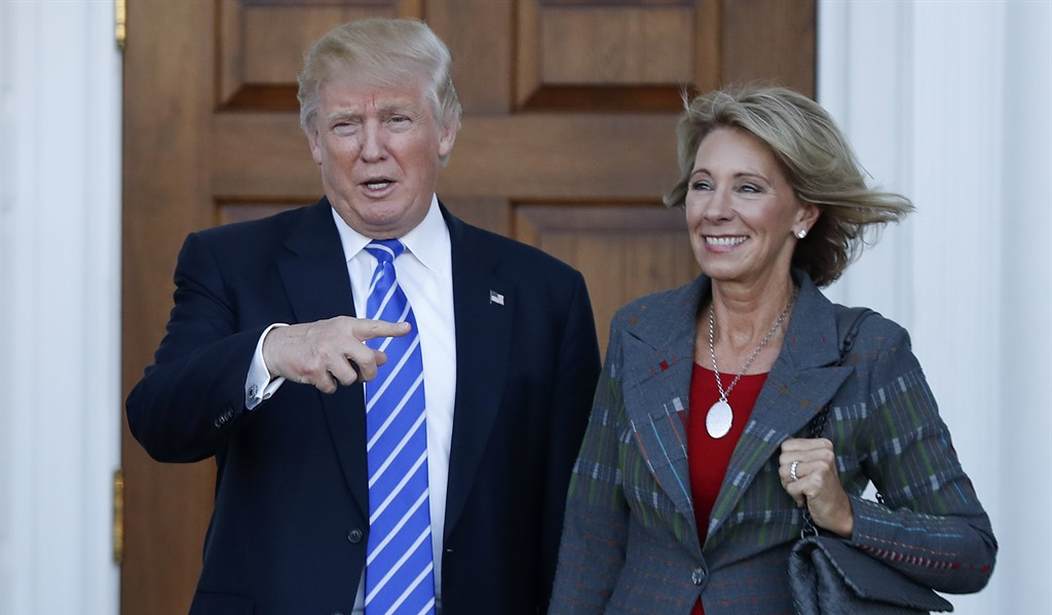President-elect Donald J. Trump has nominated Betsy DeVos, chair of The American Federation for Children, to be his education secretary and the Left is fearful needless to say. If you read The New York Times piece on her, you’d think she’s the devil incarnate, including the rather subtle swipe that she’s the sister of Erik Prince, founder of the military contracting firm formerly known as Blackwater. Cue the calls that she’s anti-public education, and how the Michigan charter school system is a mess. Okay—the Michigan system needs to be tweaked. It happens. Yet, that’s not to say that charter schools are terrible. In fact, they’re public schools. That’s one thing that some don’t seem to get when you’re discussing public schools. At the Franklin Center’s school choice conference in Denver in July—that point was made clear by Pam Benigno, Ross Izard, and Erick Valencia of the Education Policy Center.
The three offered a presentation about charter schools and enrollment in Colorado, a 30,000-foot review of the whole process. In The Centennial State, there’s intradistrict and interdistrict enrollment. Intradistrict enrollment allows students to attend any public school within their district, whereas interdistrict may enroll in any public school outside of their district. The only caveat here is space, but 87,000 students in Colorado (PK-12) attend schools outside of their districts.
They then stressed that charter school are public schools, though there are a few caveats. Charter schools cannot:
- Charge tuition
- Teach religion
- Have special entrance requirements
- Discriminate in any way shape or form
- Reject children with disabilities or those with special needs
They follow the same federal and state public school laws as any other institution that receives government dollars, and they have to have academic tests and follow the state’s standards for education.
The good thing is that they’re able to craft the way they teach the given curriculum. The bad thing news is that charter schoolteachers and administrators are often underpaid, and the charter school program itself is underfunded since these institutions pay for their own facilities. Yet, Benigno, Izard, and Valencia noted that six of the state’s top ten middles schools are charters, seven of the top ten high schools are charters, and five of the ten schools with the highest ACT scores were charters. With rigorous accountability, an emphasis on equity, high-quality education, and help from everyone, charter schools are making a difference especially with minority and low-income communities.
Recommended
The Colorado League of Charter Schools added that the 2015-16 enrollment included 51,052 students of color, which represented 46.9 percent of the total charter population in the state. The state average is 45.7 percent enrollment of students of color. Poll after poll shows that not only is school choice a winning issue, it popular with almost every demographic in the country, especially with young and Hispanic voters. Heck, even 70 percent of teachers support school choice. The American Federation for Children’s poll showed near supermajority support for the concept.
As for the coming campaign against DeVos by the teachers’ unions, let’s not forget that school choice, charter schools, vouchers, etc. are aimed at giving students in failing schools the opportunity to truly succeed in academic excellence. I’ve heard many education activists say that your zip code should not be the only determining factor in assessing one’s access to quality education. The Wall Street Journal’s piece on Mrs. DeVos was a bit more even-keeled; noting that the reason teachers’ unions are somewhat hesitant to get on the accountability train is that it could mean the loss of teachers, which is why those contracts are usually ironclad when it comes to employment. It’s almost impossible to get rid of terrible teachers in some of the most populated areas on the country. It’s because students don’t pay union dues. Mrs. DeVos most vocal critic will surely be American Federation of Teachers president Randi Weingarten:
Ms. Weingarten brings a different set of priorities to the education debate. She has fought to keep persistently failing schools open because they still provide jobs for her dues-paying members. She has fought to ensure that government officials, rather than parents, decide where a child attends school. Union influence over education policy in the U.S. is unrivaled, and Ms. Weingarten prefers it that way. Her top concern is better pay and working conditions for her members. Students don’t pay union dues.That doesn’t make her a bad person, but it should cast doubt on claims, too often swallowed whole by education reporters, that union interests are perfectly aligned with those of students and families. A union-negotiated work rule that says teachers can’t be evaluated by how much their students learn is a job-protection measure, but it obviously harms kids and school quality.
So, there you have it. Charter schools are public schools; they’re popular; when done right, they excel in academic excellence; and teachers unions only serve to benefit…teachers unions.
























Join the conversation as a VIP Member